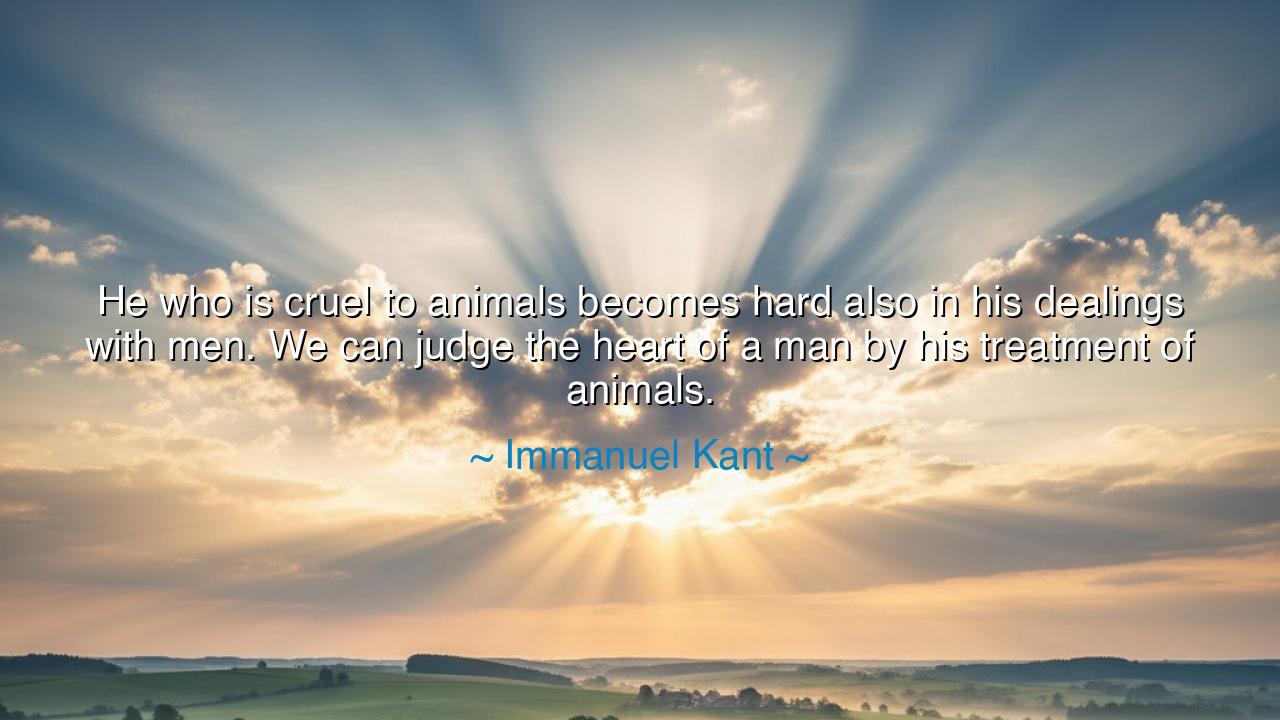
He who is cruel to animals becomes hard also in his dealings with
He who is cruel to animals becomes hard also in his dealings with men. We can judge the heart of a man by his treatment of animals.






In the quiet corners of the world, where the natural world hums with life, there lies a profound truth that speaks to the heart of humanity. Immanuel Kant, a philosopher of great renown, once said, "He who is cruel to animals becomes hard also in his dealings with men. We can judge the heart of a man by his treatment of animals." These words echo across the ages, carrying with them a message that transcends time and place: that the way we treat the creatures of this Earth is a reflection of the very nature of our humanity. To be cruel to an animal is not merely an act against the animal itself, but a reflection of a hardness in the heart, a callousness that can affect how we treat our fellow human beings.
Consider, O seekers of wisdom, the ancient truths that have been passed down through the generations, where the bond between man and nature was seen as sacred, a divine trust. The noble heroes of old, whether in the tales of Hercules or the legends of the Sumerian kings, were often depicted not only as warriors but as protectors of all life. They did not wage war recklessly, nor did they harm creatures of the wild without reason. They knew, as Kant so insightfully teaches, that a person’s true character is revealed not by the grandeur of their titles or the weight of their swords, but by the compassion and gentleness they show to those who cannot defend themselves.
In the stories of the great philosophers, from Socrates to Confucius, we are taught that virtue is not merely a matter of intellect or power, but of heart. And so it is with animals—those beings that share this world with us, but whose voices are so often drowned out by the noise of our own desires and ambitions. When a person hurts an animal, when they treat it with cruelty or disregard, it is a sign that the heart is closed, not only to the innocence of the creature before them, but to the deeper compassion that binds all living things together. Kant reminds us that the treatment of animals is not a small matter—it is an indicator of the larger moral landscape within us.
Look, too, to the example of Mahatma Gandhi, whose life was marked by his unwavering commitment to nonviolence and respect for all living beings. Gandhi believed that one’s character was revealed in how they treated the most vulnerable—not just human beings, but also animals. He advocated for the kindness and respect of all creatures, understanding that cruelty towards animals would inevitably lead to cruelty towards people. His actions spoke louder than words, as he lived by the principle that to harm another being, whether human or animal, was a violation of the very moral fabric that connects us all. His teachings are a powerful testament to the truth Kant shared—that the heart of a man can be judged by the compassion he shows toward those weaker than himself.
There is a deep and ancient wisdom in the idea that cruelty toward animals is a precursor to cruelty toward people. History is replete with examples of those who, through their treatment of animals, reveal the true nature of their character. Consider the rise of dictators and tyrants throughout history—individuals who, though they may have wielded power over nations, displayed callousness and disregard for the lives of others. Often, these same men, who could not even show compassion to the creatures that shared the Earth with them, were the ones who inflicted suffering upon entire populations. The link between cruelty to animals and inhumanity toward others is not merely philosophical; it is a tangible and dangerous force that has shaped the course of history.
Thus, the lesson we must carry forward is this: kindness and compassion are not abstract concepts, but the very foundation of a just and harmonious world. When we show mercy to the animals in our care, when we protect the helpless and the innocent, we are not merely doing a good deed; we are cultivating the very virtue that will guide our dealings with all beings—human and non-human alike. Kant urges us to examine our hearts through the lens of how we treat those who cannot speak for themselves. If we are to be true to our highest ideals, we must show respect and kindness to all life, for in doing so, we elevate ourselves and those around us.
In your own life, let this wisdom guide you. Examine how you treat the creatures of this world—whether the stray cat that wanders by, the dog who seeks shelter, or the animals that provide for your sustenance. Let your actions be a reflection of your heart, for how you treat the smallest of creatures reveals your true nature. Show compassion where others show neglect, gentleness where others show cruelty, and respect where others show disregard. In doing so, you will not only improve the world around you but will cultivate a heart that is capable of true love, one that will extend beyond the realm of animals to all who walk beside you on this Earth.






AAdministratorAdministrator
Welcome, honored guests. Please leave a comment, we will respond soon